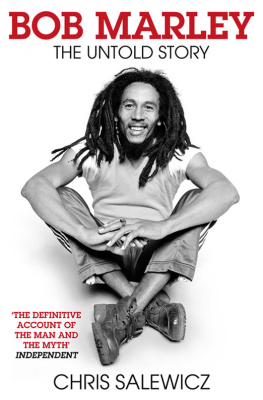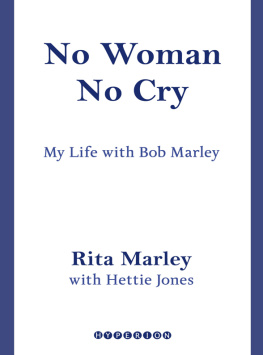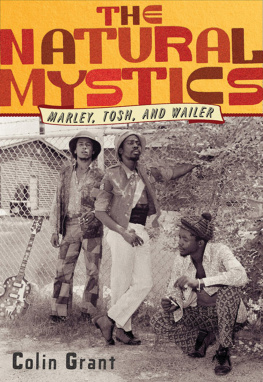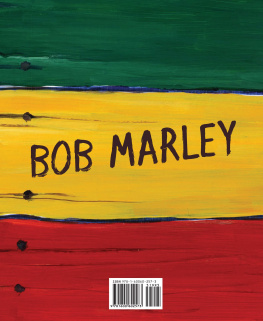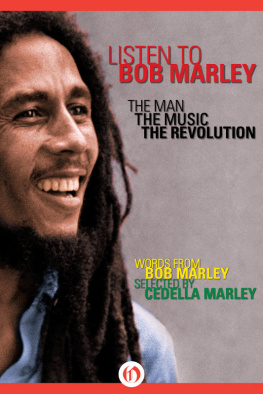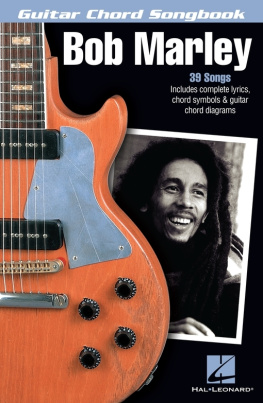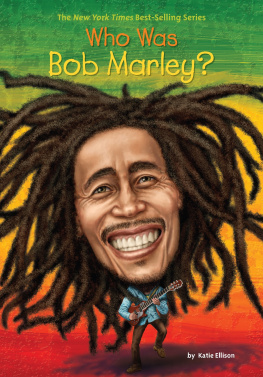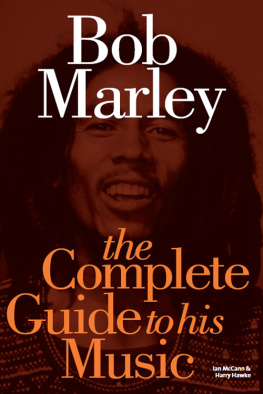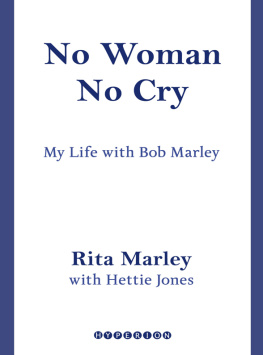Marley Bob - Bob Marley: the untold story
Here you can read online Marley Bob - Bob Marley: the untold story full text of the book (entire story) in english for free. Download pdf and epub, get meaning, cover and reviews about this ebook. City: Jamaica, year: 2009, publisher: HarperCollins Publishers, genre: Non-fiction. Description of the work, (preface) as well as reviews are available. Best literature library LitArk.com created for fans of good reading and offers a wide selection of genres:
Romance novel
Science fiction
Adventure
Detective
Science
History
Home and family
Prose
Art
Politics
Computer
Non-fiction
Religion
Business
Children
Humor
Choose a favorite category and find really read worthwhile books. Enjoy immersion in the world of imagination, feel the emotions of the characters or learn something new for yourself, make an fascinating discovery.
- Book:Bob Marley: the untold story
- Author:
- Publisher:HarperCollins Publishers
- Genre:
- Year:2009
- City:Jamaica
- Rating:3 / 5
- Favourites:Add to favourites
- Your mark:
- 60
- 1
- 2
- 3
- 4
- 5
Bob Marley: the untold story: summary, description and annotation
We offer to read an annotation, description, summary or preface (depends on what the author of the book "Bob Marley: the untold story" wrote himself). If you haven't found the necessary information about the book — write in the comments, we will try to find it.
Bob Marley: the untold story — read online for free the complete book (whole text) full work
Below is the text of the book, divided by pages. System saving the place of the last page read, allows you to conveniently read the book "Bob Marley: the untold story" online for free, without having to search again every time where you left off. Put a bookmark, and you can go to the page where you finished reading at any time.
Font size:
Interval:
Bookmark:

BOB
MARLEY
THE UNTOLD STORY
CHRIS SALEWICZ

For Dickie Jobson (14 November 194125 December 2008)
and Rob Partridge (2 June 194826 November 2008)

ME ONLY HAVE ONE AMBITION, YKNOW. I ONLY
HAVE ONE THING I REALLY LIKE TO SEE HAPPEN.
I LIKE TO SEE MANKIND LIVE TOGETHER BLACK,
WHITE, CHINESE, EVERYONE THATS ALL.
In early 1978 I spent two months in Jamaica, researching its music and interviewing many key figures, having arrived there on the same reggae-fanatics pilgrimage as John Johnny Rotten Lydon and Don Letts, the Rastafarian film-maker. My first visit to the island was a life-changing experience, and I plunged into the land of magic realism that is Jamaica, an island that can be simultaneously heaven and hell. Almost exactly a year later, in February 1979, I flew to Kingston on my second visit to the fairest land that eyes have beheld, according to its discoverer, Christopher Columbus, who first sighted the isle of springs in 1494. Arriving late in the evening, I took a taxi to Knutsford Boulevard in New Kingston and checked into the Sheraton Hotel.
Jet lag meant that I woke early the next morning. Seizing the time, I found myself in a taxi at around quarter to eight, chugging through the rush-hour traffic, rounding the corner by the stately Devon House, the former residence of the British governor, and into and up Hope Road. Bob Marley gets up early, I had been advised.
Arriving at his headquarters of 56 Hope Road, trundling through the gates and disgorging myself from my Morris Oxford cab in front of the house, there was little sign of activity. On the wooden verandah to the right of the building was a group of what looked like tough ghetto youth, to whom I nodded greetings, searching in vain for any faces I recognised. In front of the Tuff Gong record shop to the right of the house was a woman who wore her dreadlocks tucked into a tam; she was sweeping the shops steps with a besom broom that scurried around the floor-length hem of her skirt. A sno-cone spliff dangled from her mouth. Wandering over to her, I introduced myself, mentioning that I had been in Jamaica the previous year writing about reggae, showing her a copy of the main article I had written in the NME. She was extremely articulate, and I discovered that her name was Diane Jobson and that she was the inhouse lawyer for the Tuff Gong operation (over the years I was to get to know her well; and her brother Dickie, who directed the film Countryman, became a close pal).
Then a 5 Series BMW purred into the yard. Driven by a beautiful girl, it had like many Jamaican cars black-tinted windows and an Ethiopian flag fluttering in the breeze from an aerial on its left front wing. Out of it stepped Bob Marley. He greeted the ghetto youth, walked towards them, and began speaking with them. On his way over, he registered my presence. After a couple of minutes, I walked towards him. I introduced myself, and he shook hands with me with a smile, paying attention, I noticed, to the Animal Rights badge that by chance I was wearing on my red Fred Perry shirt; again, I explained I had been to Jamaica for the first time the previous year, and showed him the article. He seemed genuinely interested and began to read it. As he did so, like Bob Marley should have done, he handed me a spliff he had just finished rolling. Nervously, I took it and pulled away.
After a minute or two Diane came over. Gathering together the youth, she led them in the direction of a mini-bus parked in the shade that I had not previously noticed. Bob made his excuses We have to go somewhere and walked over to the vehicle. Then, as he stepped into it, he turned. Come on, come with us, he waved with a grin, climbing down out of the vehicle and holding the door open for me.
I hurried over. Ushering me into the mini-bus, Bob squeezed up next to me on one of its narrow two-person bench-seats, his leg resting against my own. I tried to disguise my feelings a sense of great honour as well as slight apprehension that the herb I had smoked was beginning to kick in, suddenly seeming a million times stronger than anything I had ever smoked in London. I was starting to feel rather distanced from everything, which was possibly just as well. Bumping through the potholed backstreets of what I knew to be the affluent uptown suburb of Beverly Hills, I ventured to ask Bob, who was himself hitting on a spliff, where we were going. Gun Court, he uttered, matter-of-factly.
I blinked, and tried quickly to recover myself. The Gun Court had a reputation that was fearsome. To all intents and purposes, the place was a concentration camp certainly it had been built to look like one: gun towers, barbed-wire perimeters, visibly armed guards, a harsh, militaristic feel immediately apparent to all who drove past its location on South Camp Road. The Gun Court was a product of Michael Manleys Emergency Powers Act of 1975. Into it was dumped, for indefinite detention or execution after a summary trial, anyone in Jamaica found with any part of a gun. (In more recent times, it is said, the security forces adopt a more cost-effective and immediate solution: anyone in Jamaica found with any part of a gun, runs the myth, is executed on the spot hence the almost daily newspaper reports of gunmen dying on the way to hospital ) The previous year, when I had been in Kingston with Lydon, Letts and co., the dreadlocked Rastafarian filmmaker had been held at gunpoint by a Jamaica Defence Force soldier whilst filming the exterior of the Gun Court. At first the squaddie refused to believe Letts was British; only after being shown his UK passport did he let him walk away. What would have happened had he been Jamaican?
Why are we going there? I demanded of Bob, as casually as I could.
To see about a youth them lock up Michael Bernard, he quietly replied.
Michael Bernard, I learned later, was a cause clbre.
Having descended from the heights of Beverly Hills, a detour that had been taken to avoid morning traffic (like most of the rest of the world, and especially in Jamaica at that time, when cars and car parts were at a considerable premium, this was nothing compared to the almost permanent gridlock that Kingston was to become by the end of the century), we were soon pulling up outside the Gun Courts sinister compound.
At nine in the morning, beneath an already scorching tropical sun, the vision of the Gun Court was like a surreal dubbed-up inversion of one of the ugly, incongruous industrial trading estate-type buildings that litter much of Kingstons often quite cute sprawl.
At the sight of Bob emerging from the mini-bus, a door within the main gates opened for his party. We stepped through into the prison. After standing for some time in the heat of the forecourt yard, an officer appeared. In hushed tones he spoke to Bob; I was unable to hear what passed between them, which was probably just as well it being almost a year since I had last enjoyed a regular daily diet of patois, I was beginning to register I could comprehend only about a half of what was being said around me.
Then we were led into the piss-stinking prison building itself. And through a number of locked, barred doors, and into the governors broad office, like the study of a boarding-school headmaster, which was also the demeanour of the governor himself, a greying, late-middle-aged man who sat behind a sturdy desk by the window. We were seated on hard wooden chairs in a semicircle in front of him. I found myself directly to the right of Bob, who in turn was seated nearest to the governor. Through a door in the opposite wall arrived a slight man who appeared to be in his early twenties. He was shown to a chair. This was Michael Bernard, who had been sentenced for an alleged politically motivated shooting, one for which no one I met in Kingston believed him to be responsible.
Next pageFont size:
Interval:
Bookmark:
Similar books «Bob Marley: the untold story»
Look at similar books to Bob Marley: the untold story. We have selected literature similar in name and meaning in the hope of providing readers with more options to find new, interesting, not yet read works.
Discussion, reviews of the book Bob Marley: the untold story and just readers' own opinions. Leave your comments, write what you think about the work, its meaning or the main characters. Specify what exactly you liked and what you didn't like, and why you think so.

